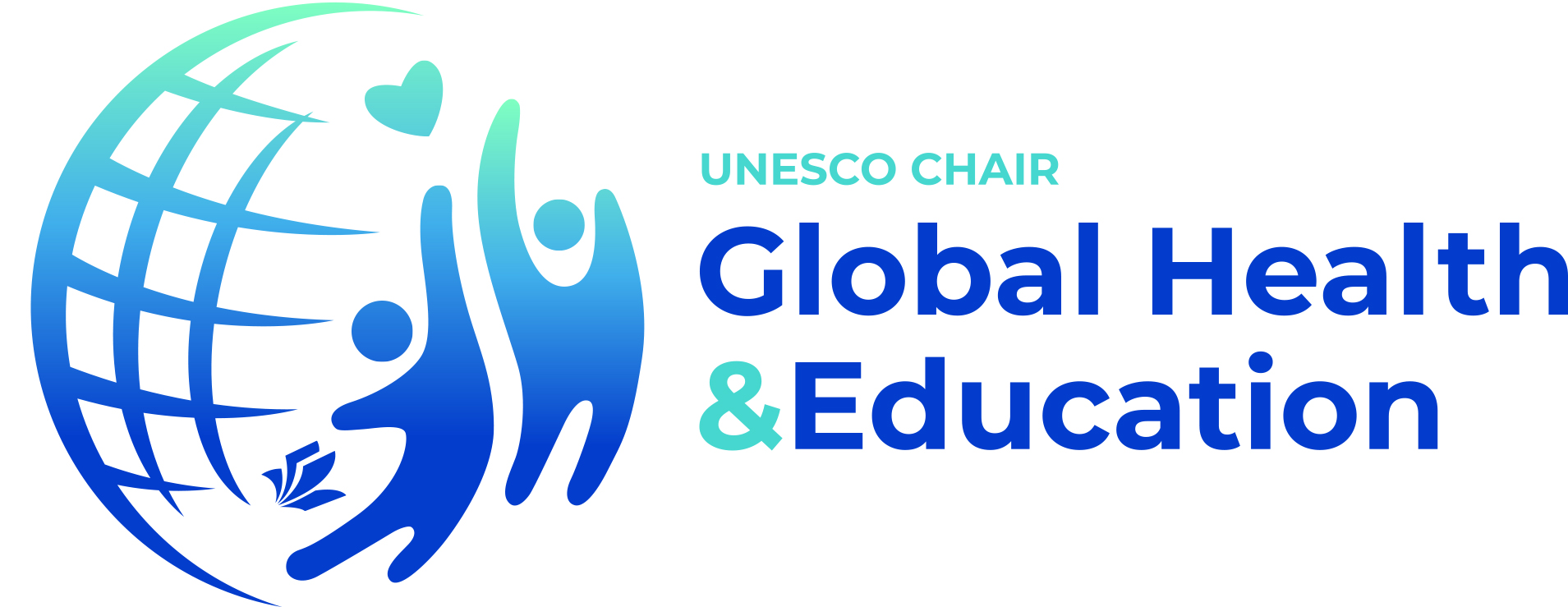Do we really acknowledge the health-education co-evolution in health promotion research, policy and practice?
Global Health & Education webinar series
3 December 2020
Openings
- Prof. Alireza Zali, Vice-chancellor of Shahid Beheshti University of Medical Sciences, Iran
- Dr. Mojtaba Zeinivand, Vice Minister of Education, Iran
- Prof. Didier Jourdan, UNESCO Chair Global Health & Education, France
Speakers

Assoc. Prof. Nastaran Keshavarz Mohammadi, School of Public Health, Shahid Beheshti University of Medical Sciences, Iran, Co-chair of the Scientific and Ethical committee, UNESCO Chair Global Health & Education

Mr. Abdul Jalal, M.A International Public Policy, M.A International Relations, External-Policy and Partnership Consultant, Aga Khan Cultural Services-Afghanistan

Dr. Nazira Sodatsayrova, Secondary School Teacher Educator, Tajikistan
Persian

The Journal Health Education is the official journal of our webinar series and aims to support the UNESCO Chair’s mission of sharing knowledge to support the global community.
Summary
The webinar will present a brief explanation of the importance of knowledge exchange and production within networks of different languages for the UNESCO Chair Global Health & Education. As well as the value of exchange of knowledge and experience among neighboring countries. Furthermore, the speakers will share with the audience the current state of health and education in the 3 Persian speaking countries (Iran, Afghanistan and Tajikistan), the challenges and achievements and their perspectives about the way forward to achieve the joint goals of “health for all” and “education for all” through the “education for health and health for education” strategy.
The following three questions will be addressed:
- What is the current status of health and education in the 3 countries?
- What is the local evidence for the link between health and education?
- What are the challenges in acknowledging the health-education co-evolution in health promotion research, policy and practice?
Introduction to the webinars in Persian
Dear Dr. Mojtaba Zeinivand, Vice Minister of Education, dear Prof. Alireza Zali, Vice-chancellor of Shahid Beheshti University of Medical Sciences, distinguished colleagues from Iran, Afghanistan and Tajikistan, dear participants, it is a great pleasure and an honour for me to open this webinar in Persian. As you know, the world is facing a number of huge challenges which ask for an innovative response from the health education and health promotion field. These include the still increasing health inequalities, the gap in life expectancy between countries as well as gaps in health outcomes within countries linked to social status, income, ethnicity, gender or disability. At the same time the climate crisis that affects everyone around the globe, asks for an adequate response.
To tackle these new challenges, all sectors and stakeholders need to work together. Health and education together are key components of sustainable development and the common good. Is the time to create new synergies in order to improve children’s and young people’s health. The UNESCO Chair and WHO Collaborating Centre aims to contribute to shape the future field of prevention, health education and health promotion. This webinar is the concrete expression of our commitment. It is entitled “Health, literacy and education in Persian speaking countries: achievements and challenges”. It is the first of a webinar series in Persian.
I would especially like to thank an internationally recognized expert, Professor Nastaran Keshavarz Mohammadi of the School of Public Health of the Shahid Beheshti University of Medical Sciences and Co-Chair of the Scientific Committee of the UNESCO global Chair on Health and Education who lead this work.
Now, I would like to introduce the UNESCO Chair and the WHO Collaborating Centre Global Health & Education. Such a combination of a UNESCO Chair and a WHO Collaborating Centre is unique. The chair aims to stimulate dialogue and action in the field of prevention, health education and health promotion for children and young people. Its role is to create a framework within which all actors in the field (researchers, practitioners and policy makers, working as individuals, in communities, networks and institutions) can meet around common projects. In order to tackle the new challenges of prevention, health education and health promotion, all sectors and stakeholders need to work together.
Like the other chairs and collaborating centres, it contributes to the dynamics of the United Nations organisations and the realisation of the Sustainable Development Goals (SDGs). Its operations are based on two inseparable dimensions:
- to create and share knowledge, and
- to contribute to social change for the health of children and young people.
The vision of the Chair is to help create the conditions for children and young people to take charge of their lives and develop as individuals, as members of their community and as global citizens for all matters related to health.
The Chair promotes a strategy of social change by introducing an innovative way of practicing health promotion, prevention and health education. It combines the knowledge of health determinants with social-cultural practices. This leads to a balanced approach concerning environmental changes and capacity building.
The Chair’s commitment to producing and sharing knowledge is linked to its ambition to contribute to the development of policies and practices that intend to improve the health and well-being of every individual, community member and the planet. The work is inspired by reducing inequalities and promoting equity. The Chair’s community relies on a broad diversity of knowledge. Knowledge from scientific research as well as knowledge from the experiences of people and communities in a wide variety of social and cultural contexts. The ecology of knowledge consists of social practices, practice-based knowledge and scientific knowledge. This is the way forward to work on a new definition of health promotion, prevention and health education, and therefore of new policies and practices. For this we need structured bodies of knowledge, an approach to inform stakeholders and tools to support political decision-making.
The Chair’s activities are focused on producing and sharing knowledge and on social change for the health of children and young people. It works on the following areas:
- to help build a global open community
- to renew the framework of health promotion, prevention and health education and adapt it to today’s needs, in particular to the needs of children and young people
- to produce knowledge
- to build capacities of actors in the field
- to share knowledge.
The UNESCO Chair Global Health & Education is defined as an open community. It is neither an institution nor a network. It provides a space for dialogue and action in the field of prevention, health education and health promotion of children and young people.
The strength of the UNESCO Chair Global Health & Education lies in the skills and knowledge of its members. Anyone can join; researchers, professionals in health, social and educational sectors, volunteers from associations, movements or trade unions, children and young people, committed citizens and legal entities (universities, local authorities, foundations, companies, networks, associations, and institutions) are welcome. The recognition of the UNESCO Chair Charter and commitment to the common initiatives are the central components. The community is open: it gives everyone the opportunity to be involved in activities on their own terms. Thus, the Chair is based on a common ambition. However, it is not homogeneous; a wide cultural and social diversity of views on the purpose of the Chair coexists. It implies that community members feel responsible and contribute in their own way to the initiatives. Welcome to the chair!
Connecting knowledge, committing to children’s health
This the slogan of the chair, this is our common endeavour!
Introduction by Professor Didier Jourdan, Chair holder UNESCO Chair and WHO Collaborating Centre in Global Health & Education
Our speakers’ contributions
Resources
Web pages on this website in Persian:
- The UNESCO Chair
- COVID-19
UNESCO Chair documents in Persian:
Other relevant documents in Persian:









